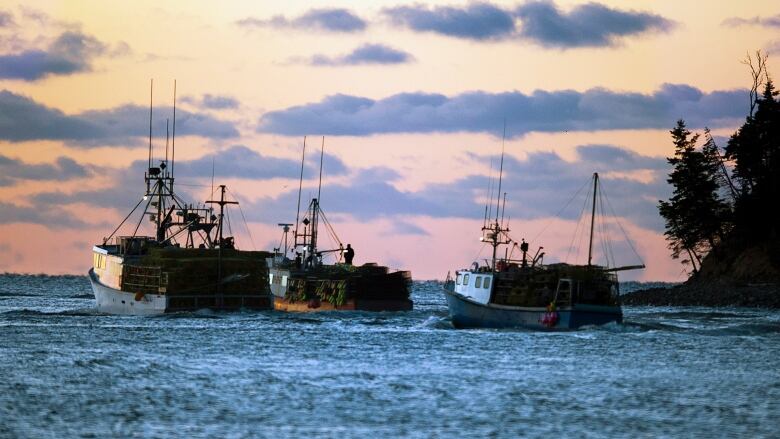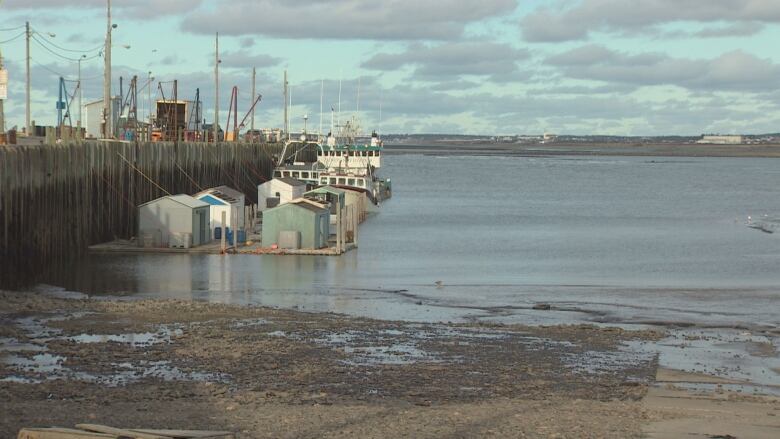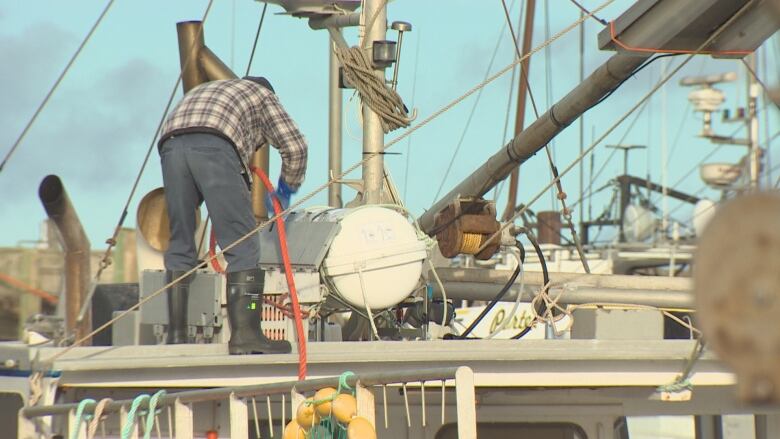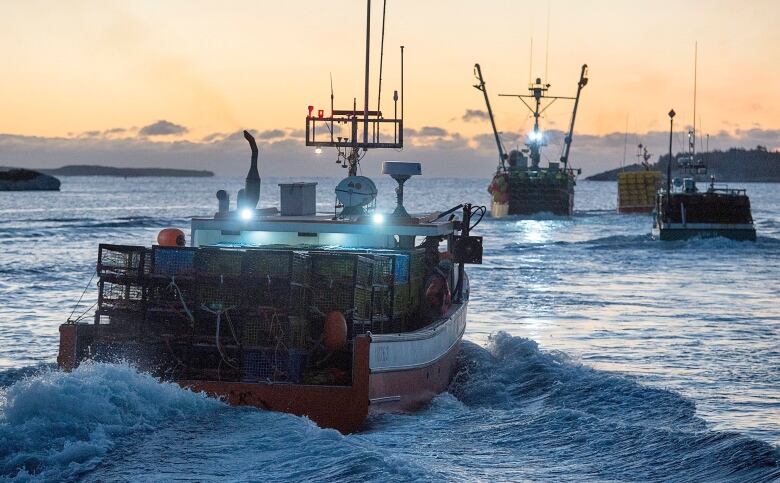Lobster fisherman defends maligned practice of 'controlling agreements'
'Twenty per cent of the boats in Meteghan wouldn't have got started in the industry without some help'

The federal government's attempt to stop corporate control of the lucrative lobster fishery is facing another challenge, and the Nova Scotia fisherman at the centre of the case has taken the rare step of speaking out about it.
Hubert Saulnier, 63, is a familiar face on the Meteghan wharf in southwestern Nova Scotia. He has been fishing for more than four decades and has held many positions with the local fishermen's association.
Saulnier is also one of 14 fishermen in a so-called controlling agreement with Yarmouth Sea Products, one of southwest Nova Scotia's largest lobster buyers.
In a controlling agreement, afisherman holds the fishing licence, but in many cases, his or her boat is suppliedby a company that reaps the profits fromthe catch.
In Saulnier'scase, Yarmouth Sea Products lent him money for his boat, and in return, he has pledgedto sell them his catch.

It'sSaulnier's controlling agreement that has resulted in an upcoming hearing with the Atlantic Fisheries Licence Appeal Board.
Although the agreements are opposed by inshore fisheries associations, Saulniersays he makes no apologies for his arrangement.
"This has been going on for 30 years," he said."As a matter of fact, it's got a lot of entrants into [Lobster Fishing Area] 34, and right now they are doing quite well."
Saulnier gestures to the bustling wharf in the Acadian fishing port, where he says 20 per cent of the 51-vessel fleet got their start with a controlling agreement with a lobster company.
DFO'slatest measure on corporate control
The Department of Fisheries and Oceans (DFO) has cracked down on controlling agreements, saying theyhave been "proliferating" and undermining policies to ensure that the benefits of an inshore fishing licence go to the fisherman holding the licence.
DFO set a 2014 deadline for fishermen to exit controlling agreements.
To enforce its position,DFObrought in a test known asPIIFCAF,or "Preserving the Independence of the Inshore Fleet in Canada's Atlantic Fisheries."

The policydoesn't prevent a fisherman from entering into a business arrangementwith a company to sell his or her catch to them. It just says the fisherman must have control over the licence when he or she wants to transfer or sell it to someone else.
A third partysuch as the companycannot control or influence the transfer.
SaulnierandYarmouthSea Products say they have crafted an agreement that isPIIFCAF-compliant, as it allowsSaulnierto sell his licenceto any core fishermen.
"When I exit the fishery, all I have to do is sell a licence to a qualified individual. Now the qualified individual has to pay me and then I pay off the rest of the loan toYarmouth,"Saulniersaid.
The man behind the agreements
For decades,YarmouthSea Products lawyer Clifford Hood has been the mastermind behind the agreements.
Saulnier'scontrolling agreement has been amendedat the request of the fisherman's lawyer to remove any conditions limiting the transfer.Those included a clause requiring a one-year notice period and another imposing a $25,000 "breakup" payment to the company.
"I am confident and so is Mr.Saulnier'scounsel that we have crafted an agreement that fully complies," Hood said.
The next step is convincing the Atlantic Fisheries Licence Appeal Board. If that can't be done,Hood predicts further legal challenges are ahead.

"Where is the clarity going to come from? It's going to come from the Federal Court of Canada," he said."In my view,that's where we are going to end up."
A legal challenge to PIIFCAFhas already made its way to the Federal Court of Canada.
Earlier this year, Justice Cecily Strickland sided with DFO, rulingthe federal fisheries minister was entitled to strip fishing licences from Labrador fisherman Kirby Elson, who was in a controlling agreement with two companies.An appeal has been filed in that case.
When asked to provide a copy of the controlling agreement, bothSaulnierand Hood declinedCBC'srequest. Nor wouldSaulniersay how much he still owesYarmouthSea Products.
The company's owner, SteveCorkum, declined interview requests.
Saulniersays the arrangement is nothing new for him and many other fishermen in this area.
"These young guysnot old like mestarted working, runninga boat for a company lobster fishing, working hard, day and night.They made some money, put the money asidethen they quit the company and bought their own rigs," he said.
"Twenty per cent ofthe boats in Meteghan wouldn't have got started in the industry without some help."
'Huge amount of value'
Saulnier's viewis one that is rarely stated publicly andis vehemently opposed by inshore fisheries associations, including the Maritime Fishermen's Union, of whichSaulnier is currently a vice-president.
Controlling agreements arethe path to a corporate takeover of the lobster fishery, the associations say.

Allain Barnett, a former research scientist with the University of New Brunswick,has written about the struggle between federal fisheries policies that spread the wealthand greater market efficiency through corporate control.
DFO has allowed "consolidation" in most other fleets, he said, but the lobster fisheryis the final battleground.
"There is a huge amount of value in these fisheries," Barnett said in a telephone interview from Miami, where he's currently conducting research withFlorida International University.
"[The lobster fishery] is essentially the last stand for the independent fish harvesters. It is extremely important to maintain fishing livelihoods in coastal communities. The fishing associations have lobbied very vigorously to maintain that independence. I think DFO has taken notice of that."
Where fleets have been allowed to consolidate, licences have become a commodity and entry into the fishery become even more restricted and expensive, said Melanie Sonnenberg, president of the Canadian Independent Fish Harvesters Association.
She pointed to British Columbia's sablefish fishery, where she said one fisherman paidan Asian owner more than $700,000 to rent the licence to go fishing.
That's where the lobster fishery is heading if DFO allows companies to control licences, Sonnenberg said.
"The handwriting is on the wall if this continues with this sort of corporate control of the fishery," she told CBCNews.

Sonnenberg also scoffed at the lack of disclosure aroundSaulnier's agreement.
"We need to see [these agreements]. We need to look at some of the hooks that are in them for younger fishermen and older fishermen who are getting out," she said. "We have to have that debate, but we can't have it if we can't see the agreementsto see what kind of controlis being exercised."
'Why bust it?'
If Saulnierwins at his hearing, it means fishermen will have found a way to be in a controlling agreement whilestill satisfying Ottawa's policy to protect the inshore fishery.
If he losesand DFOtakes his licence away, he wonders how he'll be able to repay his debt to Yarmouth Sea Products.
Both Saulnier and Hood say DFO's war on controlling agreements flies in the face of reality in southwestern Nova Scotia.
"The evidence out there is that it's working. Why bust it? There's no evidence the communities are suffering and that's the key," Hood said. "[What] we should be talking about hereis not who owns the licences,but how many there are in the community.We have to have a system that keeps the 900-odd enterprises.
"That's what we have to do,that's what generates the incomes."
Several weeks ago, Saulnier saidhe was asked to serve as a member of the Atlantic Fisheries Licence Appeal Board, where he is awaiting a hearing on his potentially precedent-setting case.
"I think I'll send in the paperwork and see what happens," he saidwith a laugh.













_(720p).jpg)


 OFFICIAL HD MUSIC VIDEO.jpg)
.jpg)



























































































